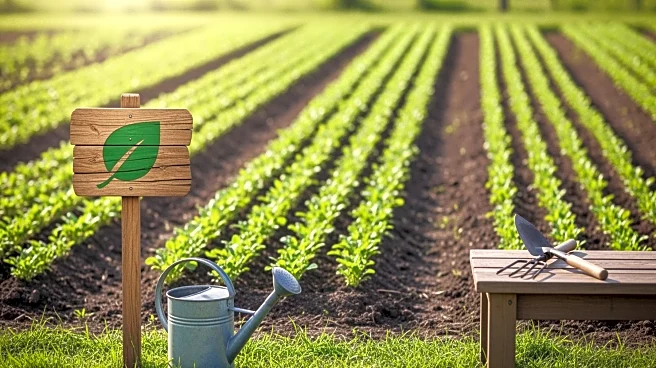What's Happening?
President John Dramani Mahama has announced a new policy requiring selected secondary schools in Ghana to establish poultry and livestock farms. This initiative aims to improve food supply and reduce feeding
costs in educational institutions. The announcement was made during the 65th anniversary celebration of Ghana Senior High School (GHANASCO) in Tamale. The policy is part of broader government efforts to revitalize Ghana's poultry sector and reduce dependence on food imports. Schools will produce their own meat, ensuring accountability in meal provision at boarding institutions. Education Minister Haruna Iddrisu also announced the delivery of furniture and buses to schools, including GHANASCO. The initiative aligns with the Feed Ghana Programme, which targets the entire poultry value chain and aims to register anchor farmers to produce millions of birds.
Why It's Important?
The school farm policy is significant as it addresses Ghana's reliance on food imports, particularly poultry, which currently stands at 95% of its needs. By encouraging schools to produce their own meat, the policy aims to enhance food self-sufficiency and reduce the country's annual import costs, which exceed $300 million. The initiative also supports the local poultry industry, potentially reducing unemployment through its extensive value chain. The Ghana National Association of Poultry Farmers has praised the policy, highlighting its potential to boost local production and employment. Additionally, the policy provides students with practical agricultural experience, contributing to skills development alongside academic learning.
What's Next?
The school farm policy will be rolled out in phases, starting with selected schools nationwide. Stakeholder engagements are expected to discuss implementation modalities to ensure the policy achieves its intended impact. The government plans to establish Farmer Service Centres in every agricultural district to improve productivity and efficiency. The AgriNext Programme will facilitate access to land banks for young farmers and connect graduates with opportunities throughout the agricultural value chain. These efforts aim to reverse Ghana's high food import bill and food inflation, while advancing exports to strengthen the economy.
Beyond the Headlines
The policy not only addresses food self-sufficiency but also aims to transform Ghana's agricultural landscape by integrating practical farming into education. This approach could inspire future generations to pursue careers in agriculture, fostering innovation and sustainability. The initiative also highlights the government's commitment to reducing food import dependency and promoting local production, which could have long-term economic benefits. By supporting youth-led agriculture, the policy may serve as a model for other West African countries, showcasing Ghana's leadership in agricultural innovation.










